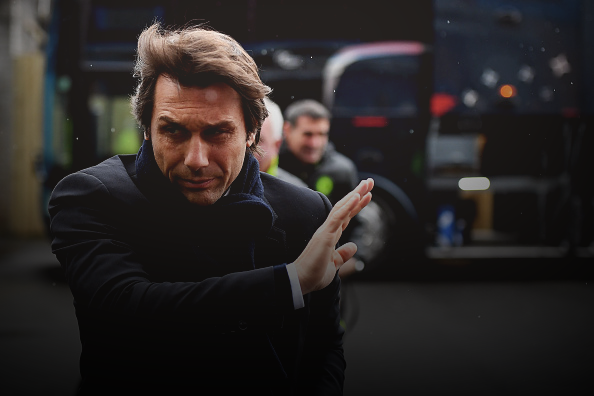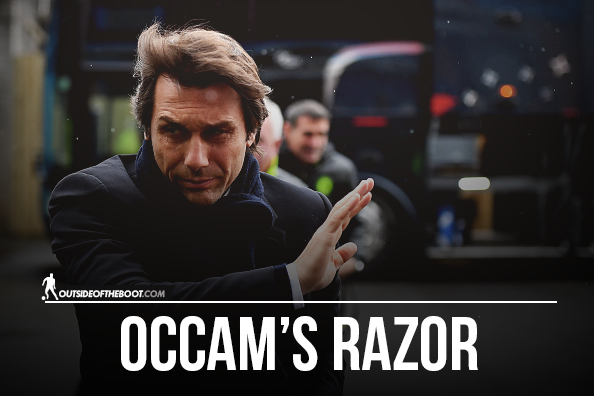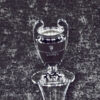Elijah Sofoluke has a look at the simplicity of management and whether football truly is a simple game complicated by idiots
“When you hear hoof beats, think horses not zebras” ~ Dr. Theodore Woodward
Replace horses with donkeys and this quote would be quite applicable to referees in football. If you hear a man behind you, there is every chance it is referee keeping up with play, readying himself to make a bad decision. My attack on referees aside, the quote serves as a warning to medicine students about going for the simplest diagnosis, rather than diagnose a rare disease. It draws upon the philosophical principle of Occam’s Razor, which states that no more assumptions be made than necessary. In short, the simpler explanation/solution is usually the better.
“Football is a simple game complicated by idiots” ~ Bill Shankly
Neville ranted on the vilification of the 4-4-2 after Liverpool drew 2-2 with Aston Villa in 2014. He compared 4-2-3-1 and 4-4-2 to the change of Starburst from Opal Fruits – same in essence but different packaging. There is very much a battle between two camps on how football should be viewed and the largest angst permeates from the Premier League. The alleged over-complication of analysis, tactics, and statistics is one that invokes such a feeling that it is a constant debate. The traditionalists line up on the side of Shankly, sneering at the hipsters for taking, what they perceive, what should be simple and turning it into a beast involving complicated, foreign phrases mixed in with pseudo-intellectual explanations, supported by reductionist statistics. Yet the hipsters believe it is merely an evolution, something that is not only limited to what is on the pitch.
The whole debate could be rooted in the fact that the managers themselves are split, broadly, into two schools of thoughts. Obviously dotted across a spectrum, akin to how a Conservative and Nationalist are both considered right wing despite their variances, you have the Pragmatists, who will do anything to win a game whatever the tactic needed in that particular, and then the Idealists, always seeking footballing utopia by achieving the zenith of attacking football. Despite the proclamation of Shankly, it always looks as if the managers look for the simplest solutions. Granted, everyone has their own thoughts on their favourite style of play. Yet the impression often left is one where the decisions of a manager are hamstrung by their own philosophy.
In England, the top six sides are evenly split between those managed by pragmatists and idealists: Conte’s Chelsea, Pochettino’s Tottenham & Mourinho’s United being under the former header and Guardiola’s Man City, Wenger’s Arsenal and Klopp’s Liverpool making up the latter. Interestingly, each side have all vaguely gone through a similar problem this season to each of their philosophical counterparts: pragmatists with scoring and the idealists with breaking down deep-block teams, each with their own reasons. Spurs’ first 11 league games only saw 15 goals and the 4-0 drubbing of Stoke in the midst of this improves the otherwise goal-shy period. Chelsea had 10 within 6 but were often prompted into a 4-4-2 to save fortunes late on in games, before permanently switching from the 4-1-4-1 to the 3-4-3. 20 league goals in 15 games for Man Utd tell its own story, as does Liverpool’s losses being an exclusive club of relegation battling teams. Everton and Leicester’s home drubbing of City, not to mention Chelsea, Southampton and Everton’s performances away to Etihad show a susceptibility to counter attacks and the formula to beat Arsenal won’t change whilst Wenger remains at the helm.
Yet, the only one who has made any comprehensive changes to the team and the way in which they play since the start of the season is Conte, and really it is more of a regression to what he is used to, whilst still adapting for his players. This balance of adhering to your style of play whilst tweaking it for your current players is incredibly hard to find. Therefore, managers are usually seen taking hard lines and persevering with it until the players themselves have acclimatised or new players suited to it are brought in. In the absence of either, you will see unfathomably weird choices being undertaken by managers in order to find what they want. You need to look at how Man Utd, Man City, Liverpool and Chelsea have dealt with issues in the full back/wing back position by placing midfielders and wingers in those positions. It’s an area that still offers somewhat of a ball in the air situation for the North West clubs listed but it begins to explain the complex decisions that managers are making in the short-term if whatever they are trying to achieve in the long-term succeeds, if they are given the time to do so.
Time is already as short as it could possibly be with managers and players, in terms of training contact time. Gabriele Marcotti wonderfully details the strains that a manager has to endure. He mathematically approximates that a top level CL participating team (on the continent) would have 34 hours of high intensity training in a 4.5 month, equating to 7.5 hours a month. For English teams, there are the added fixtures of League Cup game and lack of winter break further cutting down the amount of time available to get high-level intense training. It may not be a wonder as to why Conte is the only one to make an extensive change to the whole set-up given he has been less burdened with a pile up of games.
While Marcotti gives a sympathising view to the way managers are supposed to build philosophies with the tight, strenuous schedule, those in England are particularly quick to come to conclusions and do the metaphorical knife sticking. However, the pundits & journalists seem especially ready to do so against the aforementioned Idealists. Wenger, Guardiola and Klopp, the latter two definitively, are almost gleefully talked about when they all endured, or are enduring in the case of the German, their difficult ‘mensis horribilis’. Being idealists, they are imposers by nature. They think playing the way they do makes the opponent’s way irrelevant, as it would never trump theirs. They have a simple idea of beating the other team by being the best they can be. Nevertheless, dealing with absolutes in a game of football, its simplicity making it so complex, will often catch up to you.
Trying to apply this uncompromising view in the Premier League, with its competitive nature (that is promoted by the sheer number of games catching up with the top end clubs, aiding upsets and the ‘most competitive league in the world’ tag), is almost impossible. The prevailing idea of spirit, hard work, and passion are ones that resonate with the everyday fans. Aaron Flanagan’s assertions that “team spirit and morale wins you football matches over ‘trequartistas’ and ‘enganches’” emphasise this the most. Wenger is constantly barraged with criticism about not showing the passion on the side-line that his counterparts all seem to show and how this fact seems to rely to the lack of intensity that his XI seem to play with, without the ball, compared to the other 5 top teams. Of course, demeanour has little to do with how a team presses and organises itself yet it just another over-simplification attributed by fans and pundits alike that passionate gesticulating in the technical area has anything to do with the defensive transition of a team.
In essence, this is it. We see managers make the decisions that are unnecessary when it would be made easier by doing what is normal. A CB or RB at LB, playing without FBs/WBs, unwavering commitment to playing the same way despite the uphill case of being a goal or more down are just some of the examples. Perhaps it is important to remember that football is not an exact science and its complexities come from the fact it is such a simple game, as vague questions give way to many answers. Occam’s Razor is a principle of the simplest solution being the best but with the culture of management being at its most ruthless in history, managers are better off living and dying by what they think is right. Yet a balance has to be struck and managers struggle with the most with this. You are often told that more you learn, the more susceptible you are to the simpler things catching you out and that may be the case for the managers in the top 6 of the Barclays Premier League. Even when a horse is what you need, all you can see are zebras.


























































